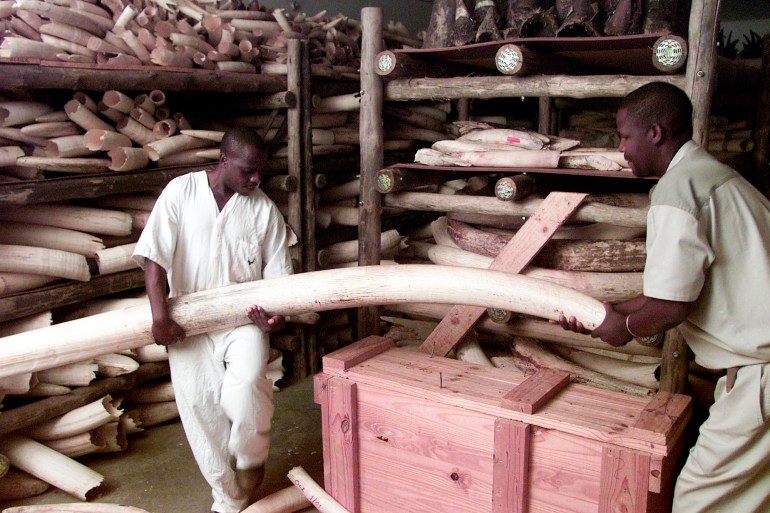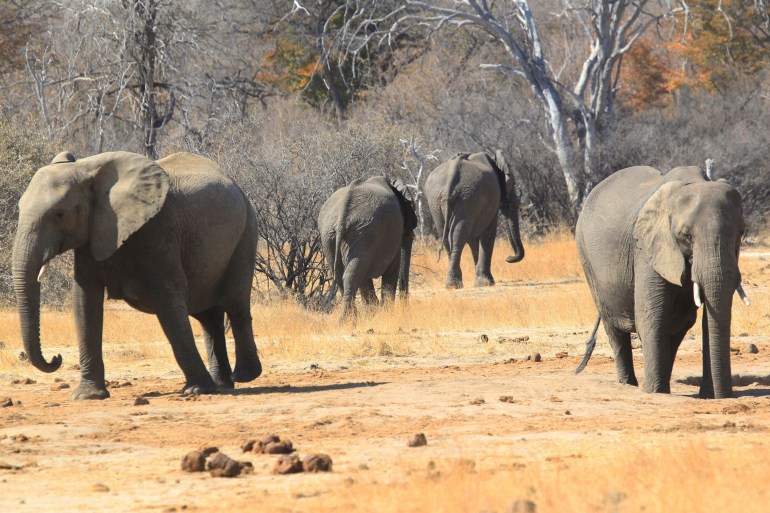[
Watching them from a protected distance on safari could be a great sight as they lumber round with their giant, floppy ears and lengthy trunks, however for individuals who stay facet by facet with elephants, these mammals are Can quickly turn out to be a risk.
The variety of elephants in African nations has declined drastically in latest occasions. Nevertheless, conservation efforts because the Nineteen Eighties have seen the inhabitants recuperate considerably. In southern African nations, the place about half the African elephant inhabitants lives, their excessive numbers imply they’re beginning to come into battle with people.
Because of this, a few of these nations have tried to scale back their elephant numbers. In Botswana, which has the biggest inhabitants of elephants on the earth, President Mokgweetsi Masisi has sought to push again controversial insurance policies corresponding to selling searching by rich vacationers. Final month, he criticized the German authorities for contemplating a ban on the import of elephant elements and threatened to ship 20,000 of his jumbos to Berlin.
The diplomatic controversy made fascinating headlines. Nevertheless it belied the intense challenges dealing with elephants, rural communities and conservationists working to search out options.

How have elephant numbers modified prior to now?
After an extended interval of overhunting and poaching for his or her meat and costly ivory tusks, elephant numbers declined dramatically throughout Africa between the Nineteen Seventies and 80s. In accordance with the World Wildlife Fund (WWF), about 100,000 elephants had been killed every year throughout that interval. WWF says an estimated three to 5 million elephants roamed the continent round 1930, however that quantity had fallen to 1.3 million in 1979. In accordance with researchers who regarded again to the 1500s, elephant populations in Africa have declined by about 98 p.c.
Numbers continued to say no from 1979 till conservation practices – together with vital restrictions on the sale of elephant elements and trophy searching – halted the decline. In accordance with WWF estimates, the entire variety of elephants in Africa presently stands at about 415,000.
That is nonetheless low in comparison with historic numbers. Particularly, the Worldwide Union for Conservation of Nature (IUCN) lists the African wild elephant as Endangered and the African forest elephant as Critically Endangered, that means they nonetheless face the specter of extinction. .
The African bush elephant is a big animal that lives within the savannah grasslands of southern and japanese Africa, accounting for 70 p.c of the continent's complete inhabitants. Its cousin – the African forest elephant – is native to western and central Africa and might be recognized by its small, rounded ears and brief, sharp tusks.
Botswana, Namibia, Angola, Zambia and Zimbabwe collectively account for greater than half of the African wild elephant inhabitants. Botswana alone is house to about 130,000 wild elephants – about half the area's inhabitants. It’s a giant nation with a small inhabitants of two million folks, comparable in measurement to France, which has a inhabitants of 67 million. There’s roughly one elephant for each 15 folks in Botswana.
Zimbabwe has the second largest inhabitants of untamed elephants, with roughly 100,000.

Why has the rising variety of elephants turn out to be a problem?
The dietary habits of the biggest land animals can dramatically alter ecosystems throughout their lives of roughly 60 years. Lucy King, a researcher at Save the Elephants, a non-profit organisation, says aside from people, they’ve few pure predators to regulate their numbers and with folks out of the best way, elephants might quickly depopulate.
“After they're left alone, they reproduce very properly (and) their numbers can improve fairly quickly over time as a result of their survival charges are so good,” King says.
Throughout the identical time that elephant numbers remained secure, human inhabitants development throughout Africa doubled. In accordance with the United Nations Inhabitants Fund, the inhabitants in Southern and Japanese Africa elevated from 312 million in 1994 to 633 million in 2021. That development has brought about people to occupy extra land space and more and more encroach on wildlife habitats. Settlements and farms have additionally eliminated roaming wildlife from water or meals sources.
Because of this, people and elephants are coming into contact extra regularly and combating over the identical sources. Herbivores typically roam fields in quest of meals, demolishing roofs of huts or damaging water pipes and different infrastructure. Angered by this, the native folks retaliated and attacked them. These interactions might be deadly for each people and animals.
Local weather change is inflicting elephant numbers to wander additional than ever earlier than – and to extra sudden locations – in quest of scarce meals and water.
King says Zimbabwe is an excessive battle zone, however human-elephant conflicts are more and more occurring all through the area.
International locations corresponding to Zimbabwe and Botswana blame elephant overpopulation and argue that lowering their numbers would cut back conflicts. Nevertheless, some specialists reject this suggestion, stating that there was way more elephants in Africa.
How have governments tried to cope with this problem?
South Africa, Namibia, Zimbabwe and Botswana have all tried to scale back elephant numbers of their territories in some unspecified time in the future, however nearly all of their strategies have met with criticism or outright condemnation from animal welfare organizations.
One follow is culling – the deliberate focusing on and killing of a number of animals, often whole households, concurrently.
This follow was standard within the Nineteen Eighties and 90s. In Kruger Park, South Africa, roughly 14,000 elephants had been killed in an operation between 1967 and 1995. Nevertheless, the follow was outlawed after African nations confronted world backlash, corresponding to widespread requires vacationers to boycott nations that kill elephants.
Nevertheless, in 2008, South Africa defied world outrage and lifted its ban on killing. In 2021, Zimbabwe – which had killed about 50,000 elephants between 1967 and 1988 – stated it was contemplating bringing again the follow.
Conservationists like King argue that killing elephants is very merciless, that are emotionally clever and may expertise trauma. Plus, this methodology isn't cost-effective and “barely scratches the floor,” she says.
Governments have additionally tried to unload elements of their herds, though animal welfare teams say the elephants might be despatched to zoos and used for human leisure.
In 2021, Namibia auctioned 170 elephants, however solely bought a 3rd – for five.9 million Namibian {dollars} ($400,000). Officers stated the sale obtained a lot unhealthy press and criticism that consumers grew to become discouraged.
One other method to management numbers is to permit trophy searching, whereby nations enable journey seekers – often vacationers from the USA and different Western nations – to hunt for his or her horns, skins and enamel in restricted numbers in particular, allotted areas. Give license to kill animals. Typically, these vacationers goal male elephants – or bulls – for his or her giant tusks.
Authorities officers in southern Africa – and hunters themselves – argue that searching helps handle elephant populations naturally and gives income for native communities. In return, native communities are inspired to cease poaching and be certain that elephant numbers stay secure – and by no means fall under sustainable ranges. A searching license can value as much as $10,000, relying on the animal being hunted.
African governments are sometimes angered by the Western view that the follow is unethical – therefore Botswana's risk to ship 20,000 elephants to Germany. Botswana's President Massey has been a specific supporter of the return of searching licenses. In 2019, after he took workplace, Botswana lifted a five-year ban on elephant searching.
What are the arguments in opposition to searching?
Some conservationists dismiss this anger from African governments.
“I believe that is extraordinarily short-sighted. “I believe it's a handy smokescreen behind which to cover and justify trophy searching which is large enterprise,” says Ross Harvey, wildlife economist on the non-profit group Good Governance Africa. Harvey factors out that many of the cash from trophy searching – first launched in colonial Kenya – goes to rich businessmen who personal trophy searching corporations, slightly than to conservation efforts.
He added, “How a lot of it truly goes to conservation is extremely questionable, definitely not sufficient to protect the panorama, and the way a lot of it goes to poor neighborhood members can also be extremely unclear.” Is.” “However now that elephant is gone, you at the moment are dwelling with the unfavorable results of taking out all of the bulls – often on the peak of their breeding.”
Older males typically assist information youthful bulls, instructing them the place to search out meals and water, or methods to behave. Researchers have discovered that when they’re hit, younger males can turn out to be aggressive.
Harvey says, “My prediction is that you simply're going to see a rise in human-elephant battle as a result of while you take out all of the bulls which are liable for disciplining the herd, crop assaults are going to extend, not “It's going to be much less.”
So what’s the answer?
Harvey says elephant numbers have elevated because the Nineteen Nineties, however the true drawback will not be “overpopulation” however people chopping away land strips or corridors that elephants – and all wildlife – use for meals. And have a tendency emigrate in quest of housing. They argue that clearing these areas will cut back human-elephant interactions.
“When you shoot them, you make the issue worse,” he says.
“There are actually solely two options,” King says. “One, to have respiration area. We maintain placing up fences in all places and stopping (elephants) from stepping into areas the place they will destroy vegetation extremely quick. The one answer is to launch the valves and ensure the enclosures come down. This doesn't imply that elephants must be in all places… however you may't fence out elephants.
In northern Botswana, an initiative referred to as the “Eco-Exist Undertaking” labored with native folks to establish and demarcate greater than 60 elephant corridors within the huge Okavango Delta. The workforce then labored with communities to revamp the structure of villages, in order that farms, houses and different infrastructure had been positioned away from these “elephant highways.”
It’s not but clear how a lot the challenge has decreased human-elephant battle, however about 65,000 hectares (160,600 acres) of agricultural land belonging to 500 farmers has been protected up to now. Farmers have fashioned teams to share farm websites, which they’ve fenced or surrounded with crops corresponding to chilli – which elephants dislike and due to this fact keep away from.
King says one other answer is to show folks to stay extra harmoniously with animals. His analysis on pure strategies of stopping elephants from settlements and farms in southern Kenya has yielded some outcomes.
King discovered that when she performed a sound recording of a swarm of bees, the elephants rapidly dispersed. He then started experimenting with constructing beehive fences round a number of farms. It is a rudimentary methodology that’s appropriate for rural communities – farmers solely want poles to arrange the hive containers. The ladies then harvest the honey and promote it for some additional revenue. This methodology is now being adopted in 17 African nations and a few areas of Asia.
“We're actually happy with it… and it's fully open supply,” says King. “We gave folks manuals, developed our personal bio-fence challenge, and had been carried out with it. And the fascinating factor is that it's working actually in all places.”
Nevertheless, this methodology solely works for small land areas. It's additionally susceptible to drought – which isn't pleasant to bees.

